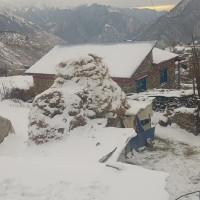- Saturday, 31 January 2026
Indigenous Millstones
Millstones, grinding slabs and other implements made of stone have been humanity's fundamental tools for thousands of years. From hunting animals in the wild to preparing food in the kitchen where raw food needs to undergo pulverisation before being cooked, such tools not only served the mankind well but also, in some ways, enabled mankind to wield control over animals and other hostile forces of nature. The fact that people still make such implements to make a living out of it is a testament to how useful such tool have been.
The family of Lalbabu Sharma in Saptari district are among those people. Sharma's family has sustained itself for three generations by crafting and selling millstones, grinding slabs and mortars. Though the family is still passionately engaged in the meticulous art of forging these tools, the youngest generation laments their dwindling demand. In the recent past, the family would sell as many as seventy pieces daily but now struggles to sell even one unit a day.
The demand has dampened so low that the family is increasingly finding itself worrying about how they will survive in the future. With the advent of modern technology, the availability of electricity and the subsequent rise of electric appliances, people are increasingly ditching millstones and grinding slabs in favour of electric mixer grinder. Sales in urban areas, where the reach of electricity has greatly expanded, have sharply declined, though demand persists in rural villages, allowing them to sustain the business thus far. This shift is a reminder of how things have changed rapidly, profoundly, and possibly, irrevocably.
The struggles of the family are a textbook example of how pervasive the impacts of technology have become. Technology is a double-edged sword. On the one hand, it eases life by freeing up people's time and manual effort; on the other, it displaces many from the profession they have relied on for decades or more for livelihood. The forces of technology have become so formidable that those who embrace it are well-equipped to face the challenges thrown by life, and those not able to do so are left behind.
But, despite all the odds, the family feels obligated to continue with the profession out of fear that their ancestral profession and its know-how would eventually die out should none of its members stay in it. The fear that is keeping it awake at night is also making it rethink its future. To cope with this unfolding reality and navigate through the imminent challenges smoothly, the family is considering providing higher education to its newest generation, so they could find opportunities beyond the profession. Given the fact that people – naturally and universally – opt for what liberates them from grinding drudgery, the family no longer can rely on the skill that once paid it handsomely.
Times have changed. People have changed, and so have their priorities and preferences. It's no wonder then that tools such as millstones and grinding slabs have fallen out of people's favour. The sooner it accepts this immutable reality and moves on, the better it will be for the family. Keeping up with the flow of time is the best way to avoid trouble later on. Arming themselves with modern education is the sure-shot way of fool proofing the future.














